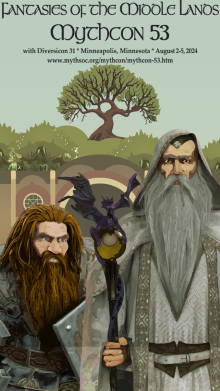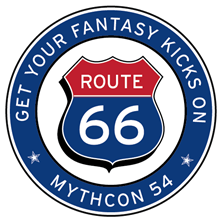Loading...
Location
Minneapolis, Minnesota
Document Type
Presentation
Event Website
https://www.mythsoc.org/mythcon/mythcon-53.htm
Start Date
3-8-2024 2:30 PM
End Date
3-8-2024 3:20 PM
Description
J.R.R. Tolkien’s “The Homecoming of Beorhtnoth Beorhthelm’s Son” (published in 1953, though substantially written by 1945) is perhaps studied more frequently for its critical apparatus (the introduction on the Battle of Maldon titled “Beorhtnoth’s Death” and the postscript on ofermod) and as a source for Tolkien’s thoughts on war and heroism than as an actual play to be performed. Recently Tolkien’s own recording of the play, performing both voices and including sound effects, became more widely available, encouraging us to consider it AS a play again. Christopher Fry’s A Sleep of Prisoners (1951) shares a number of characteristics with “Homecoming”—it is a one-act verse play, pacifist in overall effect, written in the early post-WWII years by a Christian playwright and war veteran who was an Oxfordshire resident, featuring dream sequences and contrasting the views and life experiences of younger and older characters in the aftermath of battle. Whether Tolkien knew of or was influenced in any way by Fry’s work or not, it is worthwhile to compare the themes, dialogue, theatrical effects, and impact of the two plays. This paper concludes with some notes towards producing both plays together, and how they would speak to each other about their shared themes.
Creative Commons License

This work is licensed under a Creative Commons Attribution-NonCommercial-No Derivative Works 4.0 International License.
Included in
“Giving Up Their Dead”: “The Homecoming of Beorhtnoth Beorhthelm’s Son” and A Sleep of Prisoners
Minneapolis, Minnesota
J.R.R. Tolkien’s “The Homecoming of Beorhtnoth Beorhthelm’s Son” (published in 1953, though substantially written by 1945) is perhaps studied more frequently for its critical apparatus (the introduction on the Battle of Maldon titled “Beorhtnoth’s Death” and the postscript on ofermod) and as a source for Tolkien’s thoughts on war and heroism than as an actual play to be performed. Recently Tolkien’s own recording of the play, performing both voices and including sound effects, became more widely available, encouraging us to consider it AS a play again. Christopher Fry’s A Sleep of Prisoners (1951) shares a number of characteristics with “Homecoming”—it is a one-act verse play, pacifist in overall effect, written in the early post-WWII years by a Christian playwright and war veteran who was an Oxfordshire resident, featuring dream sequences and contrasting the views and life experiences of younger and older characters in the aftermath of battle. Whether Tolkien knew of or was influenced in any way by Fry’s work or not, it is worthwhile to compare the themes, dialogue, theatrical effects, and impact of the two plays. This paper concludes with some notes towards producing both plays together, and how they would speak to each other about their shared themes.
https://dc.swosu.edu/mythcon/mc53/schedule/26


